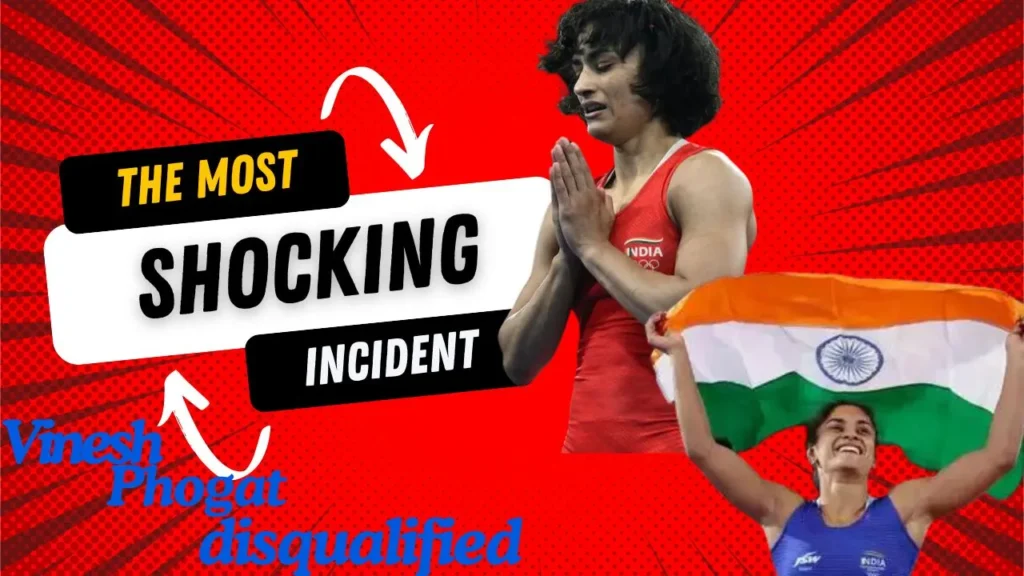Table of Contents
ToggleFinal Thoughts on the Vinesh Phogat’s Incident and its Broader Impact
Introduction
The recent disqualification of Indian wrestler Vinesh Phogat in Paris Olympics 2024, due to a mere 100 grams overweight has stirred significant discussion in the wrestling community and beyond. Weight management is a critical aspect of wrestling, where even the slightest deviation can result in severe consequences. This article delves into the incident, examining the rules, implications, and broader context of weight management in wrestling.
Background of Vinesh Phogat
Vinesh Phogat, a name synonymous with wrestling excellence in India, has had an illustrious career marked by numerous accolades. Born into the renowned Phogat family, Vinesh was destined for greatness from a young age. She has won multiple international titles, including gold at the Commonwealth Games and bronze at the World Championships, making her one of India’s most celebrated athletes.

The Incident
Vinesh Phogat’s disqualification came as a shock to many. She was found to be 100 grams over the weight limit for her category, leading to her disqualification from the Paris Olympics 2024. The rules regarding weight in wrestling are stringent, with no room for error. The immediate reactions ranged from disappointment to outrage, highlighting the high stakes involved in weight management.
Weight Management in Wrestling
Weight categories in wrestling are designed to ensure fair competition. Wrestlers often engage in rigorous practices to meet weight requirements, including dieting, dehydration, and intense workouts. However, these methods can pose significant challenges and health risks, making weight management a critical yet controversial aspect of the sport.
Implications of the Disqualification
The disqualification has significant ramifications for Ms Phogat’s career. It not only affects her immediate competition prospects but also her reputation and confidence. The wrestling community has expressed mixed reactions, with some criticizing the rigidity of the rules and others emphasizing the importance of adherence. Media coverage has been extensive, reflecting the public’s interest and concern.
The Science of Weight Management
Weight management is influenced by various biological factors, including metabolism, body composition, and genetics. Safe weight loss practices are crucial to avoid adverse health effects. Rapid weight loss, often employed by wrestlers, can lead to dehydration, muscle loss, and other health issues, underlining the need for balanced and scientifically sound methods.
Psychological Impact
The mental stress associated with weight management can be profound. Athletes like Vinesh face immense pressure to maintain weight, which can affect their mental wellbeing. Effective coping mechanisms and robust support systems are essential to help athletes navigate these challenges and maintain their mental health.
Case Studies
History has witnessed several similar incidents in wrestling. Analyzing these cases provides valuable lessons on the importance of weight management and the consequences of noncompliance. These case studies also highlight the evolving nature of the sport’s regulations and practices.
Expert Insights
Wrestling coaches emphasize the critical role of weight management in an athlete’s performance. Medical experts advocate for safe and sustainable weight loss practices, while sports psychologists stress the importance of mental health support. These insights offer a comprehensive understanding of the multifaceted issue of weight management in wrestling.
Preventive Measures
Best practices for weight management involve a combination of proper diet, hydration, and tailored exercise routines. Coaches and trainers play a pivotal role in guiding athletes through safe practices. Additionally, technological aids, such as wearable devices, can help monitor and manage weight more effectively.
Future Prospects
The incident may prompt a reevaluation of the rules regarding weight in wrestling. There is also the question of how Ms Phogat will navigate her career post disqualification. The evolution of weight management practices, driven by advancements in science and technology, promises a safer and more balanced approach for future athletes.
Conclusion
The disqualification of Vinesh Phogat in Paris Olympics 2024, underscores the critical importance of weight management in wrestling. While the incident has farreaching implications for her career, it also sheds light on the broader challenges faced by wrestlers worldwide. Ensuring fair competition and athlete wellbeing requires a balanced approach, informed by science, expert insights, and a commitment to safety and fairness.